The Proceedings of the 41st session of the Andhra Pradesh History Congress, held at Ananthapuram on January 7th and 8th, 2017.

aphc-entrance-of-the-college
The Arts and Science College, Anantapur – the venue: The Arts and Science College in Anantapur hosted the 41st session of Andhra Pradesh History Congress held at Ananthapuram on January 7th and 8th 2017. The college was established during the British reign on July 8, 1916 reportedly as part of their effort to bring advanced education to the people of the ceded districts. The institution has effectively served the educational needs of the region and has produced many stalwarts and is completing 100 years of existence in 2017[1]. The college is the alma mater of many great leaders and eminent personalities. The erstwhile Anantapur region comprised the present-day Bellary district of Karnataka, besides the Rayalaseema districts and the Nellore district.

anantapur-arts-and-science-college-google location
From Dr S. Radhakrishnan to present day: Dr. Sarvepalli Radhakrishnan, the first Vice-President and second President of India, worked here as a teaching staff for a few years in its early days. He worked as a Tutor in Philosophy in the college[2]. Former President and the first Chief Minister of Andhra Pradesh Neelam Sanjeeva Reddy was a student of this college in the early 1930s while in the later years, many luminaries like Chief Minister of Andhra Pradesh Damodaram Sanjivaiah, former ISRO chairman Padma Bhushan U.R. Rao and former RBI Governor Y.V. Reddy among many other IAS, IRS and IPS officers were associated with the college. And the present generation of students should feel proud that they are also studying in the same college!

Dr S . Radhakrishnan and Sanjiva Reddy-old-students
The Centenary celebrations and the 41st session of APHC: Currently, the college offers 31 under-graduate programs and 14 post-graduate courses and is home to 7964 students. More than 90 per cent of them belong to the economically poor and disadvantaged sections of the society. The college administration has planned to announce 2015-16 as centenary celebrations year. “An alumni meeting has been called on January 4 (Sunday) 2017 to chalk out an elaborate plan to celebrate the grand occasion in a fitting manner,” said Principal N. Ranga Swamy[3]. About the history department, the college website gives no details, except one photo[4], that is reproduced below. Though, the 41st session of APHC was decided to be hosted here coinciding with the “Centenary celebrations”, the session went on as usual.

aphc-college-front-view

govt-degree-college-dept-of-history

aphc-breakfast 07-01-2017
The College looks grand in the front, but as old as inside: The College looked old as noted and the class rooms and other places appeared withered without any facelift. The registration was done at the department of history as usual and the delegate fees was Rs.400/- and the delegates were accommodated in different lodges nearby. The list of papers to be presented was not provided to the delegates. Moreover, they were again asked to provide one hard copy, as the person in charge did not bring the papers received by e-mail, post and courier. This caused a lot of inconvenience to the paper presenters, as they had to take photocopy and give to the organizers. I have suggested many times that the editor or anybody from editorial board or his / its representative can sit with a laptop and copy all the papers to be presented, so that there would not be any practical difficulty of any sort. The CD is not opening, the required fonts missing, the CDs themselves missing (as happened many times) and all such issues could be avoided. Moreover, it is intriguing as to what the 300-500 CDs would be dealt with after the proceedings volume was printed, received by them.

aphc-entrance-decorated-to-the-dance-hall
The inauguration and thereafter (07th Janury 2017): The inauguration was to be started by 10.00 am, but, as usual, as they were expecting politicians, it was held up and delayed beyond 11 am in the seminar hall, first floor. Dr Palle Raghunatha Reddy, Minister for IT & Telugu Language & Culture, Smt Paritala Sunitha, Minister for Civil Supplies, Sri S. K. Sasidhar IAS, District Collector, Anathapuramu and others did not turn up, as printed in the Invitation card, banner, cut-out etc. Only local MLA, Sri. V. Prabhakar Chowdary came to inaugurate. Prof Sashi Bhushan Upadyaya[5] was the general president of the session, the. The following were present:

aphc-inauguration-07-01-2017-from-rhs

aphc-inauguration-07-01-2017
| Session | Sectional President | His capacity | His title of the paper |
| Ancient Andhra History
|
Dr. N. Chandramouli
|
Dept. of History, Pondechery University, Puduchery
|
The Archaeology of Rock art in Andhra and Telangana regions. |
| Medieval Andhra History
|
Prof. T. Dayakar Rao
|
Kakatiya University, Warangal
|
Irrigation Technology of the Kakatiyas. |
| Modern Andhra History
|
Dr. V. Lalitha (Retd.)[6]
|
Telugu Academy, Hyderabad
|
Tribal Studies – Reflections of a field worker. |
| Historiography
|
Prof. Venkatachalapathi
|
Madras Institute of Development Studies, Chennai
|
Writing History in colonial Tamilnadu |
| Local History
|
Sri A. Chandrasekhar
|
Retd. Principal, Anantapuram
|
Is there “Moral consent?” – A Study into unabated suicides in Amathapuramu District. |

aphc-inauguration-07-01-2017-audience

aphc-inauguration-07-01-2017-myself-with-madhu-etc
The inauguration ritual went on as usual, inviting the guests to the stage, honouring them with bouquet and shawls, lighting the lamp……and so on. Sashi Bhushan Upadyaya’s paper was “History – Writing and the making of Indian nation”. Delving upon the books of K. V. Rangaswami Iyangar, S. Krishnaswamu Aiyangar, A.S.Atlekar, G. N. Banerhee, D. R. Bhandarkar, R. D. Banerjee, R. C. Dutt, R. C. Majumdar, Radha Kumud Mookerji etc., dubbing them as “nationalist” historians, he compared with that of Marxist historians and tried to show how “Nation” was evolved. In conclusion, he just summarized what he had written in 48 pages booklet circulated[7], without giving his opinion. As I had been listening to and reading such discourses for the last 35 years, I pointed out to him, when I met him. He accepted and said that he wanted to give such details to the audience.

aphc-inauguration-07-01-2017-audience-view-rhs

aphc-inauguration-07-01-2017-audience-view-rhs-another
The Technical / paper reading sessions: After lunch, the paper reading sessions started as follows:
| Sl.No | Section | Sectional President | Room No |
| 1 | Ancient history and Archaeology | Dr. N. Chandramouli
|
Drama hall |
| 2 | Medieval Andhra | Prof. T. Dayakar Rao
|
19 (near dining venue) |
| 3 | Modern Andhra | Dr. V. Lalitha (Retd.)
|
13 (Physics Department) |
| 4 | Local History | Prof. Venkatachalapathi
|
14 (Physics Department) |
| 5 | Historiography | Sri A. Chandrasekhar
|
31 (Near photo exhibition, furst floor) |
The papers had been as usual and I could not find anything new, as they were mostly depended upon secondary sources and the subject matter was already known. Of course, the sectional presidents themselves were pointing out the facts and advising certain paper presenters, who could not present their papers properly.

aphc-medieval-section-07-01-2017 Dr Dayakar Rao chairing

aphc-medieval-section-07-01-2017-audience-view
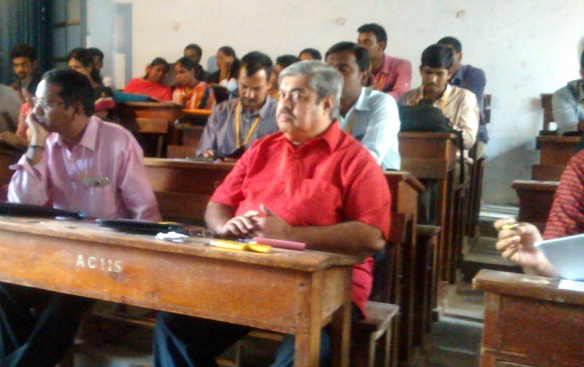
aphc-medieval-section-07-01-2017-kvr-sitting

aphc-medieval-section-07-01-2017- Dr Madhusudan Rao-presenting-paper
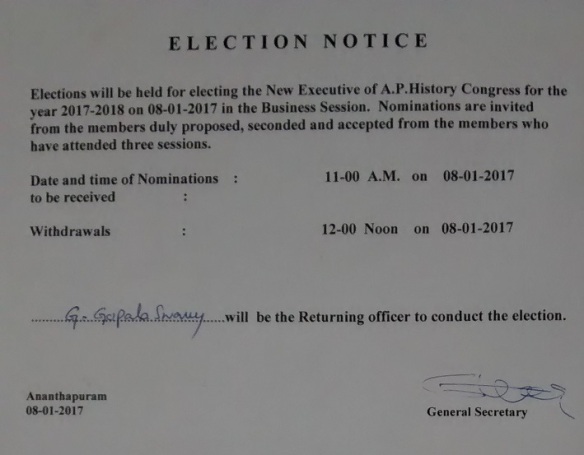
aphc-election-notice-07-01-2017
Election for the Executive Committee of APHC: “Election Notice” dated 08-01-2017 was putup near the APHC office informing that “Elections will be held for electing the new executive of A.P. History Congress for the year 2017-18 on 08-01-2017 in the Business Session. Nominations are invited from the members duly proposed, seconded and accepted from the members who have attended three sessions. Date and time of Nominations: 11.00 am on 08-01-2017, withdrawals 12.00 Noon 0n 0-01-2017.” As there were no elections, it is evident that already, the members selected / chosen had been accepted. However, as the executive committee meeting was held on 7th evening till midnight, it was intriguing to note why such notice was pasted, when none filed nomination. In any case, this proved that some of the “interested delegates” were not satisfied with the “chosen-EC members” regularly. Of course, I have not witnessed any election taking place in APHC.
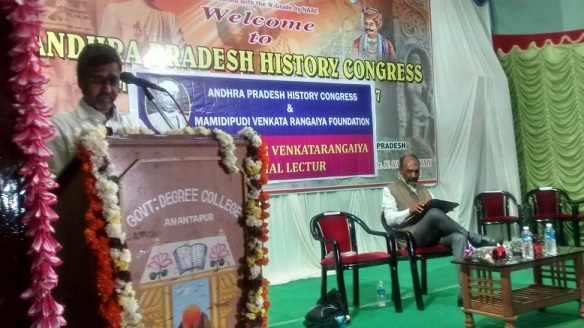
aphc-inauguration-07-01-2017-a-r-venkatachalapathy-lecture
Mamidipudi Venkata Rangayya Memorial Lecture (07-01-2017): “Dirty words: A cultural History of Swearing and Abuse” was delivered by Prof. Venkatachalapathi, Madras Institute of Development Studies, Chennai on 07-01-2017 in the evening. He was dealing with abuse, curse, name-calling, bad-language used etc., by people at strange, enraged and bizarre circumstances. In 19th century, the dirty words appearing in the Shakespeare were removed by Thomas Bowdler and known as the process “bowdlerizatoion”. In the same way, the British government allowed certain Tamil literature, after expurgation of some portions[8]. In cinemas, rarely bad words were used than literature mentioning how the word was used in “Aburva ragangal” of Kamal Hassan. His choice of examples had been selective, as if only those used such bad language and others did not. He had conveniently suppressed the fact of how the Dravidian leaders used abuse on the stages in filthy language, with lewd and immoral words. He was also trying to imitate such abuses had been “patriarchal” in nature, as if, women never abuse. Though, he had been loquacious, garrulous and verbose, he never uttered any dirty word, except “bastard”. He implied four words, the word “F….K” citing some examples.

vss-sastri-silver-tongue-orator

aphc-inauguration-07-01-2017-a-r-venkatachalapathy-dirty-words
Tanjore Brahmins vocabulary: He claimed that the Tanjore Brahmins vocabulary contained “dirty words”, taking clue from “Silver tongue” V.V.S. Sastri[9]. Quoting Sastry, he was trying to force that he was using vulgar language (no rabid dog would cross). He never uttered anything about other as pointed out, thus, obviously exposing his ideological bias. He was repeating from his writings already available in Tamil and English[10]. In fact, most of the stuff, he read in English was obviously translated from his own article appeared in “Kalacchuvadu”[11]. And I know all and found nothing new. In fact, I wanted to question him, but, as usual sensing my presence and readiness to get up, the organizers cleverly announced that no questions would be allowed! “Good words” indeed against “dirty words”!

aphc-a-r-venkatachalapathy-audience
In India, there have been certain writers, film-field experts and others, who get fame only for projecting the negative aspects, which have been part of any society, nation, could be observed every where. Yet, they posing as “intellectuals” sell India in that way and get laurels. However, when they visit the foreign countries, they do not go to rural sides and villages, observe happenings there and narrate here or anywhere! This biased, one-side and prejudiced projection has been intriguing. I wonder as to why this type of “Endowment” lectures are arranged when the Indian society has already been under attack by different divisive forces working with ideology. Even the History congresses have been affected by such ideologies as pointed out by me in other postings.

aphc-a-r-venkatachalapathy-audience-rhs
Book release function, cultural programme and dinner (07-01-2017): After that, there was a cultural programme. Actually, the performers came ready, but, had to wait till 8.00 pm, as the “Book release function” help up them with the release of five books with the introduction of the authors briefing about the books and the authors starting briefing about their books. This made some kids (10-15 aged children), who came for performance with dress with enthusiasm started sleeping and they were made to wake up to be ready for the programme later by 8.30 pm. Ironically, it was announced that the dinner would be served only after the cultural programme. After the programme, there was a “stampede” like situation at “dinner venue”, as there was not enough light and the quality of food was not good. Later, it was accepted that it was prepared hurriedly at the canteen and so on.
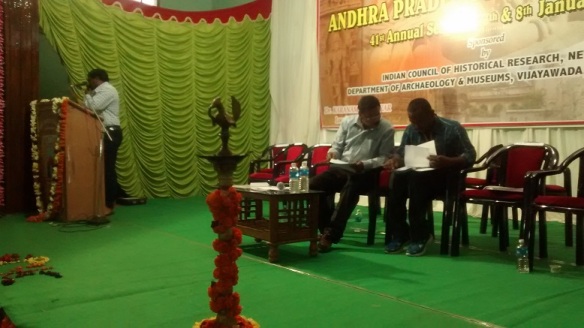
aphc-ancient-history-section-08-01-2017

aphc-ancient-history-section-08-01-2017-audience-view
APHC – second day – The Technical / paper reading sessions continued (08-01-2017): The paper reading session continued on the second day also. It went on as usual with characteristics of reading paper, getting certificate and going away, as they did not have patience to listen to others. They do not have courtesy to listen to others or perhaps they think that they need not do so! Even first-time paper presenters also do the same. Nowadays, a lot of materials (books, e-books, papers, reports and others) are available to the researchers. For the University and college students, much more is available, as they could access to International journals and download research-papers also. Therefore, selecting a topic, they can collect materials and prepare a good paper for presentation.
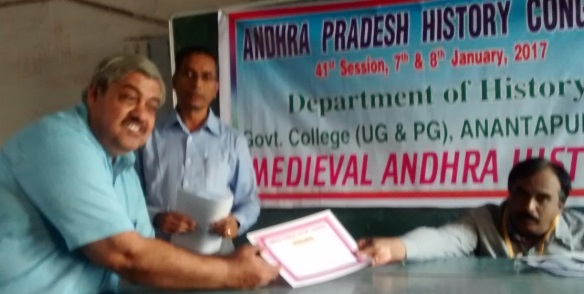
aphc-medieval-section-08-01-2017-kvr-after-presenting-paper

aphc-medieval-section-08-01-2017-audience-shanmugam-sitting

aphc-medieval-section-08-01-2017-delegate-receiving-certificate

aphc-medieval-section-08-01-2017-audience
In the “Ancient history” section 35 papers were presented; Medieval 37; Modern – 65; Local history – 15 and Historiography – 5 and thus, totally, 157 papers were presented during the whole session.

aphc-08-01-2017-lunch-vegetarian

aphc-08-01-2017-lunch-veg

aphc-08-01-2017-lunch-non-veg

aphc-08-01-2017-lunch-non-vegetarian
The Business session and Valedictory function (08-01-2017): The business session was held after lunch. On 8th, the food was arranged “Veg and non-veg” basis and as usual, the NV enjoyed both! Of course, there were few to take “Veg” there! The new executive committee members unanimously chosen were declared. Other things went on as usual. The next APHC, 42nd session may be held at Kakinada in 2018.
[1] The Hindu, Anantapur Arts and Science College to turn 100 years,V. K. Rakesh Reddy, Anantapur: January 03, 2015 00:26 IST; Updated: January 03, 2015 00:26 IST
[3] http://www.thehindu.com/news/national/andhra-pradesh/anantapur-arts-and-science-college-to-turn-100-years/article6749265.ece
[4] http://www.gdcatp.org/departments/history/about.php
[5] Dr. Shashi Bhushan Upadhyay is Professor with the Faculty of History. His research interests are mainly in the fields of Labour History, Dalit Studies and Literary studies. His publications include a book titled Existence, Identity and Mobilization: The Cotton Millworkers of Bombay, 1890-1919 (2004), two co-edited volumes Dalit Assertion in Society, Literature and History (2010) and School Education, Pluralism and Marginality (2012) and about 20 articles on Labour, Dalits and Premchand. He has been involved for many years in all aspects of preparation of study material for distance learners. He has written about 20 units for Post-Graduate and Under-Graduate distance learners on Historiography, Labour Movement, and Tourism Studies. Presently he is the coordinator for an M.A. course on Indian National Movement and supervising some Ph.D. students. His current research engagement is in the field of Historiography. Official Address: School of Social Sciences , Indira Gandhi National Open University (IGNOU), Maidan Garhi,New Delhi – 110068; Phone. +91-011-29533845, 29572739; e-=mail- sbu11@hotmail.com
http://www.ignou.ac.in/ignou/aboutignou/school/soss/faculty/detail/Dr_Shashi_Bhushan_Upadhyaya-437
[6] Instead of her, handled the Modern history section without anybody’s assistance.
[7] Sashi Bhushan Upadyaya, History – Writing and the making of Indian nation, Govt. College (UG & PG), Anathapuram, Andhra Pradesh, p.49.
[8] A.R. Venkatachalapathy, The Province of the Book: Scholars, Scribes and Scribblers in Colonial Tamilnadu, Permanent Black, Ranikhet, 2012, chap. 6.
[9] Valangaiman Sankaranarayana Srinivasa Sastri CH PC (22 September 1869 – 17 April 1946) was an Indian politician, administrator, educator, orator and Indian independence activist. He was acclaimed for his oratory and command over the English language. Srinivasa Sastri was born to a poor temple priest in the village of Valangaiman near Kumbakonam, India. He completed his education at Kumbakonam and worked as a school teacher and later, headmaster in Triplicane, Madras. He entered politics in 1905 when he joined the Servants of India Society. Sastri served as a member of the Indian National Congress from 1908 to 1922, but later resigned in protest against the Non-Cooperation movement. Sastri was one of the founding members of the Indian Liberal Party. In his later days, he was strongly opposed to the partition of India. Srinivasa Sastri served as a member of the Madras Legislative Council from 1913 to 1916, Imperial Legislative Council of India from 1916 to 1919 and the Council of State from 1920 to 1925. Sastri also functioned as India’s delegate to the League of Nations, as member of the Privy Council of the United Kingdom and agent to the Union of South Africa.
[10] By Sascha Ebeling (Ed.), Colonizing the Realm of Words: The Transformation of Tamil Literature in Nineteeth-century South India, Sunny Press, State University of New York Press, Albany, USA, 2010.
http://www.vikatan.com/juniorvikatan/2012-jul-29/sensation/22006.art
[11] A. R. Venkatachalapathy, Vayile nalla varudhu (Coming from mouth conveniently), in Kalaccuvadu, September, 2013.http://www.kalachuvadu.com/archives/issue-165/%E0%AE%B5%E0%AE%BE%E0%AE%AF%E0%AE%BF%E0%AE%B2-%E0%AE%A8%E0%AE%B2%E0%AF%8D%E0%AE%B2%E0%AE%BE-%E0%AE%B5%E0%AE%B0%E0%AF%81%E0%AE%A4%E0%AF%81
